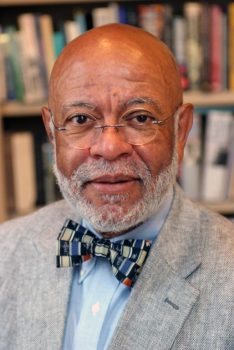W&L to Name New Center of Southern Race Relations, Culture, and Politics in Honor of Ted DeLaney Washington and Lee University will name a new interdisciplinary academic center for teaching and research on Southern race relations, culture, and politics in honor of late professor of history emeritus Theodore “Ted” Carter DeLaney Jr. '85.
Washington and Lee University will name a new interdisciplinary academic center for teaching and research on Southern race relations, culture, and politics in honor of late professor of history emeritus Theodore “Ted” Carter DeLaney Jr. ’85.
The Theodore DeLaney Center will explore contemporary racial issues through a variety of disciplinary approaches and theoretical perspectives.
“Ted was known to people across the W&L community as a wise, thoughtful, and generous teacher whose passion for justice and inclusion was evident both in the classroom and in his scholarship,” said W&L President William C. Dudley in announcing the center’s name. “Ted’s work provided keen insights into the history of the university and the local community. His personal history and the example that he set for all of us represent the best of the university’s core values. The center that bears Ted’s name will be a model for the work that was so important to him and remains so critical to the understanding and advancement of our society in the future.”
DeLaney’s scholarship focused on the untold histories of African Americans in Virginia, including his research on John Chavis, who was the first known African American to receive a college education in the United States in the 18th century and who studied at Liberty Hall Academy. In addition, DeLaney recorded oral histories of western Virginians directly involved in the battle over school desegregation 15 years after the Brown v. Board of Education Supreme Court ruling. Much of his research found its way into his courses and the presentations he developed for alumni colleges, class reunions, neighboring colleges, museums and historical societies. DeLaney’s own oral history is now part of W&L’s Special Collections.
During his career at W&L, DeLaney taught courses on colonial North America, comparative slavery in the Western Hemisphere, African American history, civil rights, and gay and lesbian history. His popular Spring Term course on the civil rights movement took students on the path of the Freedom Riders through the South, while his course on the institutional history of W&L introduced students to archival research in W&L’s Special Collections & Archives.
In 2005, DeLaney co-founded the Africana Studies Program, which he directed from 2005-07 and again from 2013 to 2017. He chaired the History Department from 2007 to 2013 and was the first Black department head at W&L. He also served on both the Working Group on the History of African Americans at W&L and the 2018 Commission on Institutional History and Community.
“My father dedicated his life’s work to telling the stories of oppressed and underrepresented people in the Western Hemisphere, particularly in southwestern Virginia and the American South,” said Damien DeLaney. “He would have been very pleased to be remembered through the mission of the DeLaney Center to carry this important work forward.”
The DeLaney Center’s core mission — an interdisciplinary consideration of race in Southern society — will strengthen the recruitment and retention of underrepresented minority faculty at W&L by establishing an academic resource that is distinctive among top liberal arts institutions. It will also encourage students to produce original work supported by W&L’s extraordinary Special Collections & Archives, archaeology collections, and surrounding sites, and will create student opportunities to complement programs offered by Institutional History and Community-Based Learning.
“We are excited to begin recruiting scholars for the DeLaney Center,” said W&L Provost Lena Hill. “The DeLaney Center will complement ongoing work in programs more heavily focused on diverse people from around the world. Given W&L’s location and history, this new academic hub will provide distinctive opportunities for scholars whose work examines the racial issues that have defined and continue to shape the U.S. South. It will also take full advantage of our unique curricular structure to connect colleagues with related teaching and scholarly interests across the College, the Williams School, and the School of Law.”
 Ted DeLaney ’85
Ted DeLaney ’85
You must be logged in to post a comment.